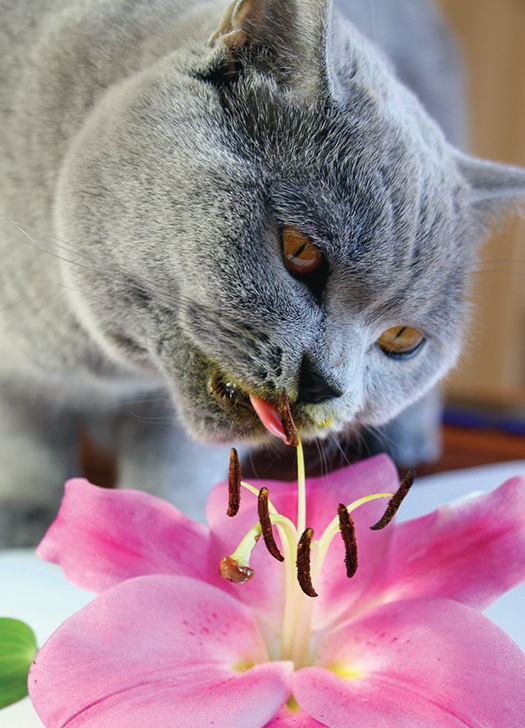A quick response if your cat licks, chews, or swallows a harmful substance can mean the difference between life and death. But you must know what to watch for, and, unfortunately, Easter brings its candidates for a feline disaster.
Plastic Easter Grass
It’s fun for cats to bat around, tug, and chew—and it can be a blast to watch their antics. Unfortunately, if your cat swallows any of it, she may end up with a blockage that requires surgery. If you see plastic grass in your cat’s mouth, do not try to pull it out. The end may be in the intestines and, if you tug on it, it could cause further damage. Instead, call your veterinarian. Prevention: Use paper confetti in your Easter baskets.
Chocolate
While not on par with dogs, some cats do have a sweet tooth. Chocolate contains caffeine and theobromine, both of which are poisonous to cats (and dogs). They can cause seizures, heart failure, and death. Dark chocolate is the worst, but even white chocolate is rich enough to cause pancreatitis. Prevention: Keep all candy in a covered bowl or in a cupboard safe from inquisitive felines and collect all hidden chocolate Easter eggs when the game is over.
Lilies
These beautiful Easter plants are extremely toxic to cats. This warning includes all lilies, including the Easter lily (Lilium longiflorum) and daylilies (Hemerocallis). These plants, fallen leaves, pollen, and even the water from a vase of lilies can cause acute, life-threatening kidney failure in cats. Prevention: Just say no to lilies. Do not bring any arrangements with lilies into your house and don’t grow any of the toxic lilies in your yard.
Dinner Table
While most house cats know the family dinner table is off limits, leaving unattended aromatic food around may be too much to resist. The traditional Easter Ham is too salty for your cats and may be fatty, which can cause gastrointestinal upset. Even grapes and raisins, which can be in Easter breads and fruit salads, are toxic to most cats. Prevention: Don’t share human foods with your cats.
Baking Goods
Uncooked dough can be toxic to pets. The raw yeast ferments the carbohydrates in the dough while releasing carbon dioxide and alcohol (making the bread rise). The alcohol can cause alcohol poisoning. Signs include ataxia (unstable gait), tremors, hypotension, hypothermia, respiratory depression, and seizures. The risk of aspiration is high as ethanol is directly irritating to the stomach, causing vomiting, yet it also paralyzes the muscles that close the epiglottis. If your cat does investigate your baking and eats some of the raw dough, contact your veterinarian immediately. If any time has passed, the dough may be expanding in her stomach as it ferments, making her uncomfortable and unlikely to be able to vomit much up. Prevention: Be sure uncooked dough is out of your cat’s reach when you leave it to rise.




